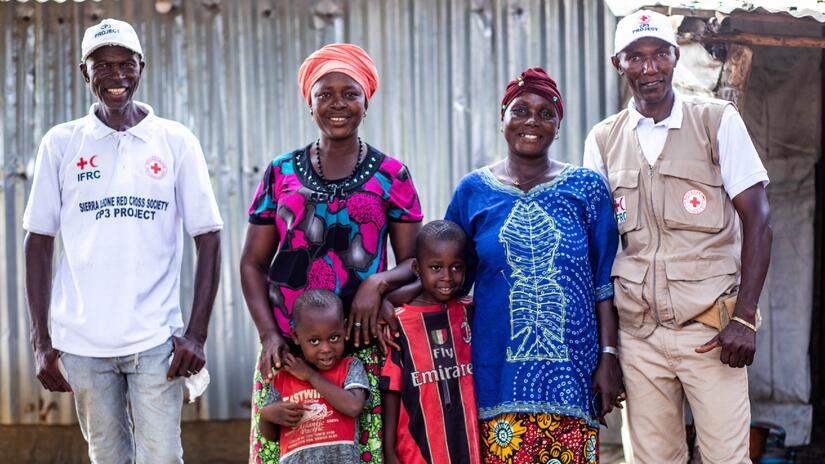Makuma is a remote coastal village nestled in the north-west corner of Sierra Leone, on the border with Guinea. It’s only accessible by one narrow and bumpy dirt track.
Its 2,000 or so inhabitants travel by foot or on motorbikes in the drier months. But when waters rise in the rainy season from May to December, the track becomes unusable—cutting people off from their nearest health centre, some 10km away.
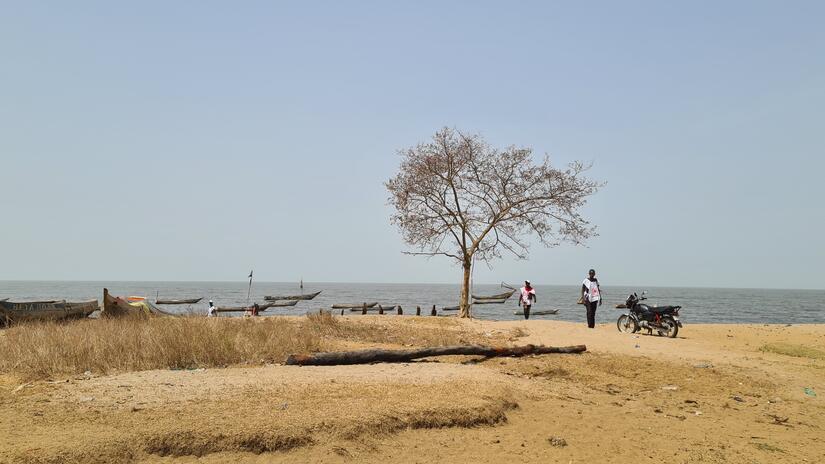
The dirt/sand track into Makuma, Kambia district, doesn’t see cars very often, and even motorbikes struggle to get around. In the rainy season, the track becomes unusable, forcing residents to travel via wooden boat to access local health services.
Photo: Rebecca Cole/IFRC
Its isolated location, coupled with the high risk of infectious diseases in Sierra Leone, means Makuma could be the perfect breeding ground for an epidemic, if it weren’t for one thing: the presence of the Sierra Leone Red Cross Society.
Momoh Saio Kamara is Makuma’s local Red Cross volunteer. He grew up in the village and is much loved and trusted, thanks to his work supporting people through the 2014/15 Ebola outbreak.
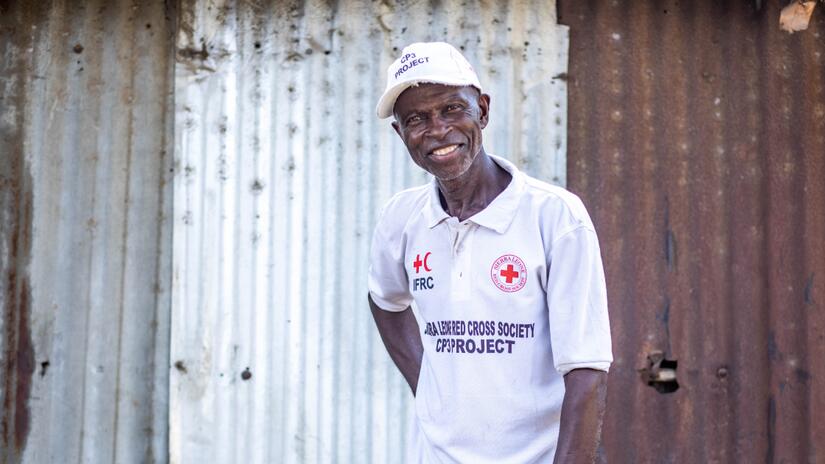
Momoh has been a volunteer with the Sierra Leone Red Cross Society for many years, helping his local community in Makuma cope with health outbreaks - including the 2014/15 Ebola outbreak.
Photo: James Tamba-Martha/Sierra Leone Red Cross Society
In 2019, Momoh was trained in epidemic control and community-based surveillance through the USAID-funded Community Epidemic and Pandemic Preparedness Programme (CP3)—acquiring the skills and tools needed to detect, alert, and respond to disease outbreaks early.
So when, in early 2022, people in Makuma started noticing strange symptoms of a mystery illness they’d never seen before, Momoh knew exactly what to do.
“One day I was in the village doing house visits. I visited my friend who said there is someone—the nose is red, the mouth is red, the nose runs and there is a rash. I go and look and I thought straight away, it is measles,” explains Momoh.
Without hesitating, Momoh alerted his supervisor, Jobel, using a digital community-based surveillance system set up through the CP3 programme. Jobel arrived shortly afterwards on his motorbike to investigate. Seeing the symptoms for himself, he escalated the alert in the system—notifying district health authorities in an instant.
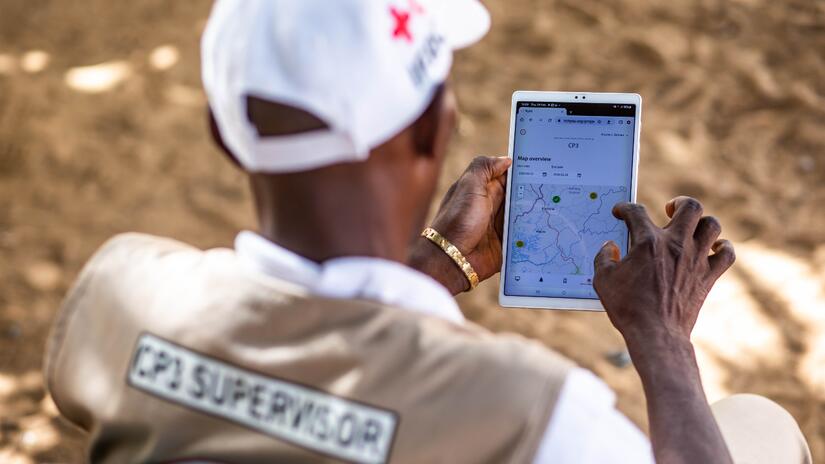
Jobel, a supervisor with the Community Epidemic and Pandemic Preparedness Programme (CP3), uses a tablet to access a digital community-based surveillance system, enabling him to track health alerts in Kambia district and quickly escalate cases to local health authorities.
Photo: James Tamba-Martha/Sierra Leone Red Cross Society
“After the alert, I rang the local nurse and called a community meeting to tell the people it is suspected measles,” adds Momoh.
A highly contagious viral infection, measles spreads easily among the unvaccinated. It’s a serious illness that can require hospital admission, cause permanent disability, and even kill if not treated properly.
Local nurses swiftly arrived and started tracing and registering suspected cases, while Momoh and Jobel went house-to-house to tell people how to stay safe.
The following day, a Rapid Response Team from Kambia district hospital arrived to undertake testing, conduct a ring vaccination of nearly 800 children to minimize further infection, and tend to patients.
“The Red Cross and District Health Management Team they come. It did not take long. When they arrived, again we called a meeting, we talked to the community. We told them these people have medicine and it is free,” explains Momoh.
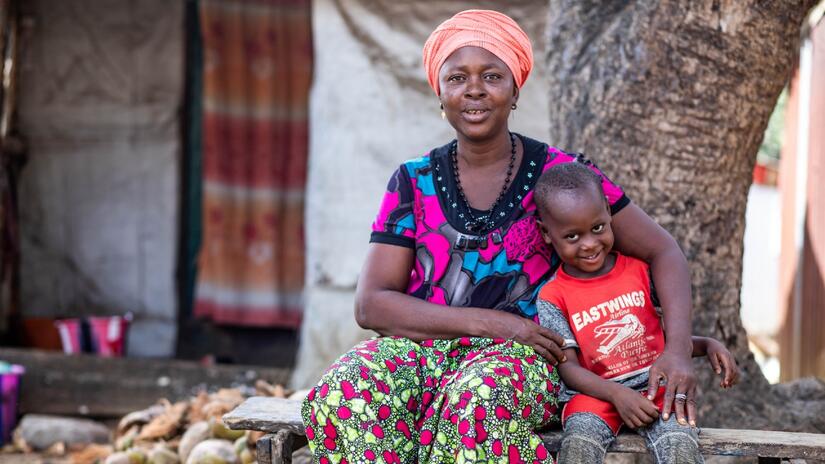
N'Mah and her young son, Morlai, sit together and smile in Makuma village in early 2024, two years after the measles outbreak which threatened their community.
Photo: James Tamba-Martha/Sierra Leone Red Cross Society
For N’Mah, a woman from Makuma whose young son caught measles, having Momoh by her side was a huge relief.
“My son Morlai fell sick. I had no idea what the illness was and I felt worried and restless. Momoh held a community meeting to let people know he thought it was measles. He told us what he knew about the disease and asked people to tell him if they noticed anyone with the same symptoms. He told us to keep our environment as clean as possible, wash our hands properly, and isolate anyone who showed signs of the illness. I felt really happy because the health services came really quickly,” explains N’Mah.
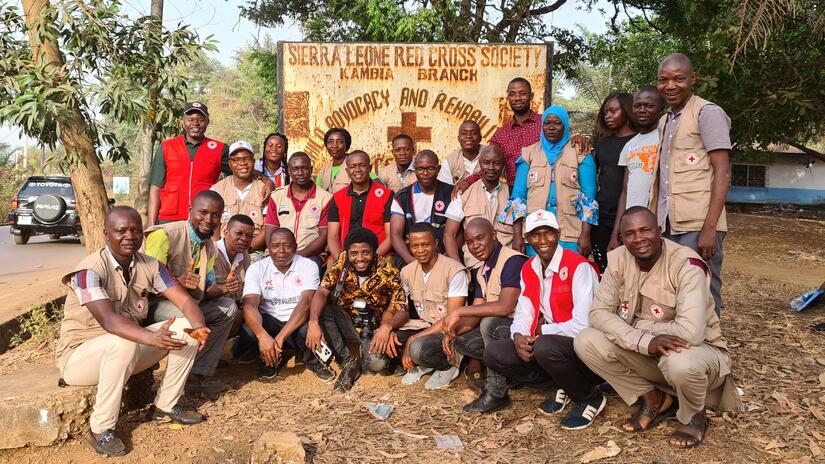
Supervisors and staff from the Community Epidemic and Pandemic Preparedness Programme in Sierra Leone stand together outside the branch office in Kambia.
Photo: Rebecca Cole/IFRC
Momoh is one of 250 volunteers in Kambia district trained through the CP3 programme. Together, they are the eyes and ears in hard-to-reach communities, making sure no suspicious health event goes undetected.
A total of 124 measles cases were eventually recorded during the outbreak in Makuma. The number could have been significantly higher had it not been for Momoh’s early action, the trust placed in him by his community, and the rapid response from local health authorities.
“The successful response which prevented deaths and disability is a result of the early detection and reporting by the Red Cross volunteers, followed by a swift response from the District Health Management Team. It is no exaggeration to say that these volunteers help greatly towards the health care delivery system in Kambia district, especially in public health surveillance,” explains Ishmael Rogers, Kambia District Surveillance Officer.
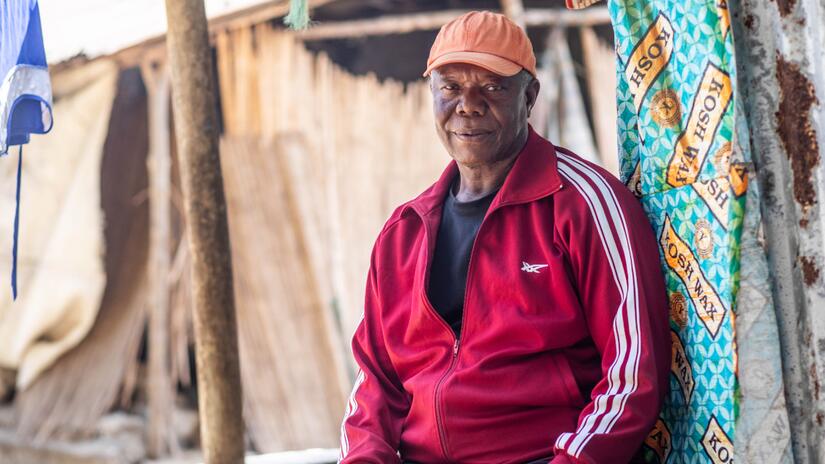
Yusif T Kamara, Councillor for Makuma, feels relieved to have the support from Momoh and the CP3 programme in his village.
Photo: James Tamba-Martha/Sierra Leone Red Cross Society
For Makuma village Councillor, Yusif, who has steered his community through difficult times such as Ebola and COVID-19 in recent years, the relief at having Red Cross support in keeping his people healthy is palpable.
“I feel happy that Momoh is here. He’s always available for our community – any day, any time. He’s very patient. When our people are sick, he makes sure they are taken to hospital. I feel my community is safe with Momoh. God forbid there is another outbreak, we know Momoh is here for us.”
--
The rapid outbreak detection and response reported in this article were made possible thanks to the Community Epidemic and Pandemic Preparedness Programme (CP3).
Funded by the U.S. Agency for International Development (USAID), the programme supports communities, National Societies, and other partners in seven countries to prepare for, prevent, detect and respond to disease threats.
If you enjoyed this story and would like to learn more:
- Sign up to the IFRC’s Epidemic and Pandemic Preparedness Newsletter
- Follow the Sierra Leone Red Cross Society on X, Facebook and LinkedIn
- To learn more about community-based surveillance initiatives within the IFRC please visit cbs.ifrc.org

